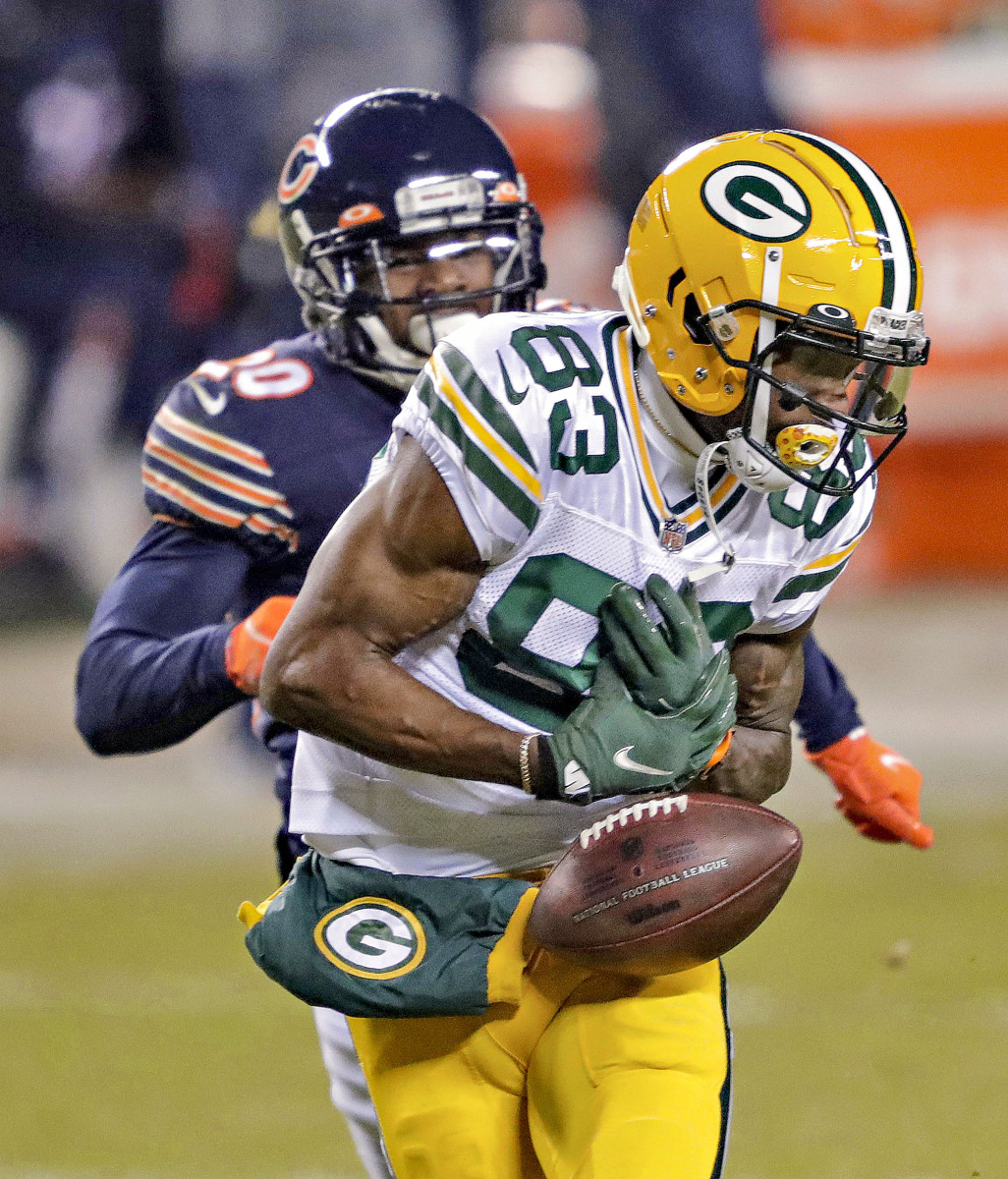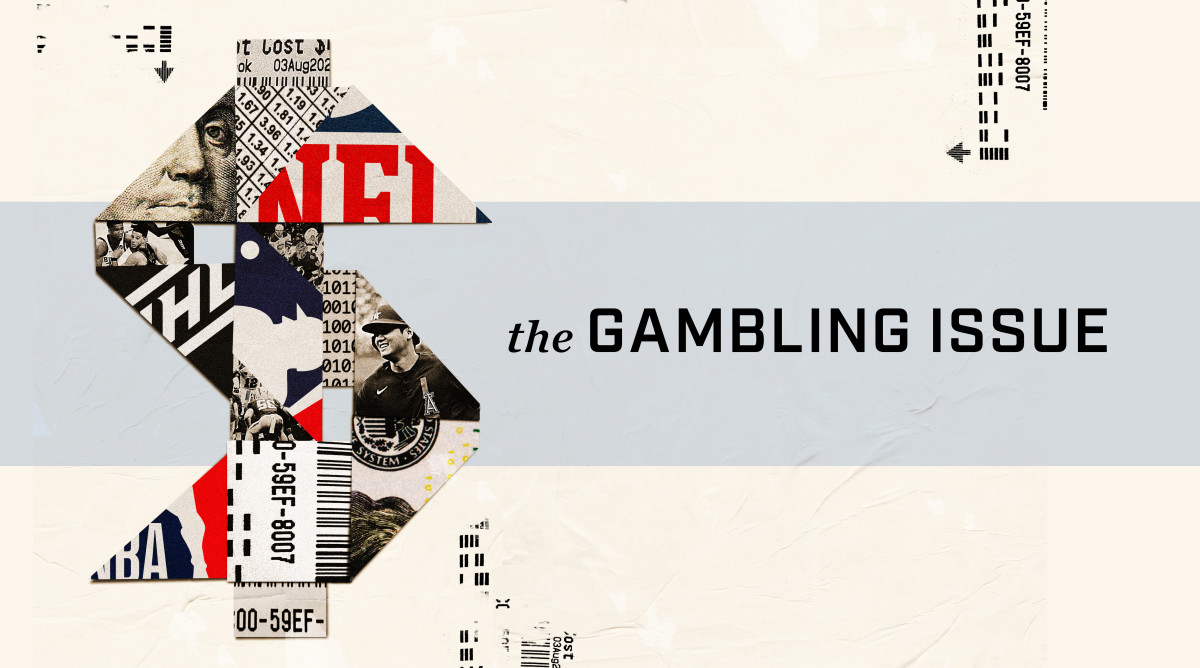The Blame Game

What’s changed in the three years since the Supreme Court granted all 50 states the right to legalize sports betting? Everything. By the end of 2021, online or in-person wagering will be sanctioned in more than half the country. Revenue is skyrocketing. Leagues are evangelizing. And booming business means big changes for anyone who operates, plays, covers—or bets on—the games we love. Welcome to the Gambling Issue.
Last October, a little more than four hours before the Week 4 Monday Night Football kickoff at Lambeau Field, Packers receiver Marquez Valdes-Scantling posted a public service announcement for his Twitter followers. “Please stop DM’ing about your fantasy teams,” he wrote. “I promise you, I don’t care.”
Valdes-Scantling was responding to more than 200 messages he’d gotten over the preceding days, each of them detailing a version of the same scenario: With star wideout Davante Adams sidelined due to a hamstring injury, the sender had plucked Valdes-Scantling from the waiver wire and thus needed him to perform well against the Falcons. “Those messages are going to come every single day during football season, especially right around game time,” Valdes-Scantling says now. “It’s not enjoyable for the players.” Worse, though, was the blowback that Valdes-Scantling got after he had just four receptions for 45 yards in Green Bay’s 30–16 win. “When you get fans hounding you, saying, ‘You lost me the game because you didn’t get this [number] of points,’ or ‘I lost out on money because of you,’ that’s when it becomes really annoying,” he says. “It’s not about the sport anymore. It’s about the finances you’re making off me.”
By now, tweets like that from players like Valdes-Scantling, like leaves changing color and Bills fans leaping through tables, are annual rites of fall. (A few years ago, a Reddit user compiled “The All-‘I Don’t Give A F--- About Your Fantasy Team’ Team,” a full roster of NFL players who had publicly declared their apathy for the hobby in which, according to the Fantasy Sports & Gaming Association, approximately 46 million U.S. adults participate.) Indeed, the dynamic is one of dehumanization and commoditization, reducing athletes to their stat lines in service of Joe Fan competing for prize money.
“Obviously, there’s some good fun out of fantasy,” Valdes-Scantling says. “But when you get people’s money involved, you start getting all sorts of hate mail.”

With this in mind, Valdes-Scantling wonders how he and other athletes will be affected as the U.S. sports landscape enters the age of wide-spread legalized sports betting. On one hand, the financial benefits will be huge for leagues with collectively bargained profit-sharing. “The most obvious positive is that it’s going to drive a lot of revenue, and [players] are our partners, so they’re the recipient of us growing the pie,” says Ted Leonsis, the Capitals, Mystics and Wizards owner whose Capital One Arena in D.C. opened the nation’s first in-stadium sportsbook in May.
On the other, says Mark Griffiths, a professor of social sciences at England’s Nottingham Trent University and the director of its International Gaming Research Unit, “the higher the event frequency of an activity, the greater association it has with problem gambling.” Think slot machines in casinos. Or, in this case, live, in-play wagers available on mobile betting apps.
Here the ramifications are obvious, too. “When you have money involved, there’s always going to be anger,” Valdes-Scantling says. “Especially when fans are close to you, it can definitely heighten the situation. Imagine losing $5,000 and having the access to throw something at me.”

Read More From the Gambling Issue
As Executive director of the National Basketball Players Association, Michele Roberts witnessed an alarming number of incidents involving unruly fans throughout the 2021 postseason. Hawks guard Trae Young was spit on at Madison Square Garden. Kyrie Irving of the Nets was hit on the head with a water bottle in Boston. The Jazz banned three spectators for hurling racist insults at the family of Grizzlies guard Ja Morant. Wizards star Russell Westbrook had popcorn dumped on him in Philadelphia.
“Maybe all those assaults [were] prompted by someone making a bet,” Roberts says. “When you have skin in the game, above and beyond just being a fan in the sport, people behave differently. I worry about that. I worry about the physical safety of our players.”
While there is no specific evidence tying any of the above mentioned instances to gambling, such situations are easy to imagine. Relevant data in the U.S. is hard to come by, according to Mack Costello, an assistant professor of psychology and director of Rider University’s on-campus gambling—it wasn’t until mid-2018 that the Supreme Court overturned the Professional and Amateur Sports Protection Act (PASPA), thereby opening the door for state-sponsored sports betting. “Then we had a wash year with COVID,” Costello notes. But research from Australia and Europe, where sports betting has been legal for decades, suggests a clear link between in-game wagering and serious gambling problems.
“It’s attracting the more high-risk, impulsive gamblers who traditionally are less of the sports bettors,” Costello says. “As that group gets more and more involved in American sports, I would imagine you’ll have more of the young man, high-impulsive kind of gambler doing that live, in-play betting. And, of course, most people who gamble will just have fun. But among sports bettors, a higher percentage have problems than the general population.
“And if we were going on this dehumanization route, some of the same behavior appears in games with professional athletes, where people are enraged, and they’re thinking about what’s happening to them, and not really about the athlete as a person.”
For example: In early 2018, The Telegraph interviewed 20 tennis players, all of whom reported receiving steady streams of social media abuse after defeats, including death threats. “If I go check my phone now, there will be some crazy gamblers that are upset with me,” said Bob Bryan, then a U.S. doubles standout with 23 Grand Slam titles. And it wasn’t just big-name players who were affected. Jay Clarke, an English pro whose highest career-singles ranking is No. 153, added, “It must all be to do with gambling. That’s the only thing I can think of because they don’t know me or really care if I win or lose.”

Two recent cases in the U.S. judicial system follow a similar pattern. In 2019, Addison Choi, a former soccer player at Babson College in Wellesley, Mass., was sentenced to 18 months in prison for sending graphic, threatening messages to at least 45 Instagram accounts of professional and collegiate athletes and their loved ones. “[Choi] made all these threats intending and knowing that they would be perceived as threats, because he thought those players or teams would lose or had lost him gambling money,” read the charging document.
A year and a half later, in June 2021, a prolific gambler known as Ben “Parlay” Patz received 36 months’ probation for threatening players from the Patriots, four Division I universities and 10 MLB teams, among others, over his gambling losses. One sample message sent to a Rays player who had gone hitless in a loss, according to the affidavit, read as follows: “Unfortunately 0–5 against the Chicago White Sox isn’t going to cut it. Because of your sins, I will have to behead you and your family.”
Roberts worries that hurling those insults online will lead to more dangerous objects being tossed: “Part of what I’ve asked the league, in concert with arena security, is to do a better job before the fact—spot a guy and position themselves, so at the moment the fan begins to do something that’s at risk to the players or other fans, get them out.”
Problem gambling is far from the only reason athletes are harassed online, of course, just as harassing athletes online is hardly the sole symptom of problem gambling. And social media abuse isn’t the only potential issue for players as sports betting continues to grow, either.
A month after the Supreme Court’s decision on PASPA, lawyers for players’ unions in five pro sports—baseball, basketball, football, hockey and soccer—sent a joint letter to state and federal lawmakers “urging states to approve laws and regulations that protect players who report contact with people seeking to influence games,” the Associated Press wrote at the time. “Among the players’ concerns are fears that proposition bets on actions during a game could taint the product on the field, leading fans to question whether the plays they see are legitimate.”
Roberts brings up the two free throws that Clippers star Paul George missed with 8.2 seconds left in Game 2 of the Western Conference finals against the Suns, which Los Angeles eventually lost by one point. “Not everybody has a perfect game, and not everybody hits every free throw,” Roberts says. “Normally we say, ‘Darn.’ But if I had $1,000, or, god forbid, $100,000 on a spread, I’m probably not going to be saying, ‘Tough luck, Paul.’ I see that on the horizon. I see every mistake or bad play that results in someone losing money—if there’s an apparatus to lodge a complaint, and therefore initiate some investigation, that’s going to happen.
”Fans crying foul might be inevitable, but leagues can at least take steps to protect their workforce and help their fans on several fronts. Griffiths notes how, in his native U.K., “every single gambling operator” voluntarily puts money into GambleAware, an independent charity that then redistributes the funds toward research, education and treatment; in Australia, such contributions are mandatory. “That should be a model that’s applied everywhere all over the world,” Griffiths says.
In a similar vein stateside, Costello encourages sports leagues to divert portions of their betting proceeds toward help lines or other treatment programs, such as the Massachusetts-based International Center for Responsible Gaming. He also recommends that leagues “be ready to spend some money on security” to stave off potential incidents both in person and online, “because it’s almost an inevitable outcome of doing more of this, as this stuff gets promoted.”
League officials will note that sports betting fueled an illegal billion-dollar industry long before states began permitting it, and thus the concerns related to security and integrity are nothing new. The NBA, for example, has mandated training programs for all league personnel since at least 2007, educating players, coaches, staff and referees on its gaming policy.
If anything, league officials say, legal betting will allow their organizations to work in tandem with sportsbooks to stave off potential trouble, such as by setting relatively low dollar maximums on midgame prop bets, which were largely impossible to make with street bookies. Besides, according to Dan Spillane, NBA senior vice president for league governance and policy, the league hasn’t observed any increase in incidents of harassment directed at players as sports betting has expanded. “We’re monitoring it, and keeping track of it, and we’ll be prepared to respond to anything that happens with our security department and our teams’s security departments, as appropriate,” Spillane says.
For Valdes-Scantling, his solution is simply to never open the direct message if he doesn’t know the sender. But he can still see snippets from glancing at his inboxes on Twitter and Instagram, which he says range from the mundane fantasy beef—I needed you to score 14 points!—to the multiple death threats that he received after losing a fumble in overtime of a Week 11 loss to the Colts. “There’s going to be an extra level of anger if you’re losing money,” Valdes-Scantling says, and even though he doesn’t make it a habit of responding on social media, he nonetheless has a message to any fan who feels obligated to let him know just how much money they lost on his account. “Well,” he says, “just go bet it on something else.”
• How the League Went On Defense
• Do Today's Fans Blame Athletes More For Betting Misfires?
• A Pizza Joint in Jersey: The Place To Place Your Bets
• The Beats Go On
